
Music
Megadeth’s snarling, paranoid Dystopia
Keepers of the thrash metal flame can breathe a raspy sigh of relief with the release of Megadeth’s Dystopia. After 2013’s Super Collider, an odd concept album gone awry, Dave Mustaine and company have returned to their blistering roots.
The subject matter may seem metal enough, but a closer look at Dystopia reveals a very different perspective than is often found in the genre. While the “whole world is going to hell” attitude may be a metal mainstay, in Mustaine’s case this is nothing to celebrate. Dystopia is a snarling, almost paranoid rumination on political madness, monsters and societal decay.
Megadeth has featured a rotating cast of characters for many years. With the notable exception of co-founding bassist David Ellefson, the band has essentially been Mustaine. For Dystopia, however, he has assembled one of the best lineups in the band’s long history. Guitarist Kiko Loureiro (of the Brazilian metal band Angra) and drummer Chris Adler (from Lamb of God) dive headfirst into Mustaine’s rapid-fire creations. The tracks are impeccably mixed and the results are brutal and impressive. With the exception of Mustaine’s slightly deeper voice, Dystopia bears more similarity to the band’s breakthrough albums Rust In Peace or Countdown to Extinction than anything from the last 20 years. This lineup’s ability to crank the thrash meter to 11 without sacrificing clarity and melody sets a new bar for the genre. When it comes to what fans love about Megadeth, Dystopia is a true return to form.
This musical palate is the perfect environment in which to explore the nature of evil.
This musical palate is also the perfect environment in which to explore the nature of evil and the source of individual and societal dysfunction. Lyrically, Mustaine almost nails that. Almost. With a few exceptions, most of the songs here focus on conspiracy theories, anger at a wasteful and corrupt government and the decline of American superiority in the world. Sprinkled throughout are portraits of evil characters, alongside ruminations on the inner compromise that leads to external decay. The lyrics occasionally divert into a thinly veiled and unfortunate conflation of liberal politics and existential evil, and thus capture much of the current conservative political zeitgeist (fear, moralism, intentionally politically incorrect sentiments). This is not your father’s metal, to be sure.
Mustaine’s well-documented conversion to Christianity over a decade ago caused frustration among many fans. Though he has never proselytized, it was somewhat difficult for metal fans to adjust to Mustaine’s new conservative worldview. His refusal to perform certain songs due to his changed beliefs and a reluctance to share stages with anti-Christian bands created a sort of heavy metal cognitive dissonance. Ellefson, who returned to the Lutheran faith in which he was raised, is working on a ministry degree. It’s an interesting situation, to be sure.
Metal is to music what horror is to film. Considering the scariest movies are the ones that internalize terror, it would be fascinating to hear Mustaine aim his rhetorical blowtorch a bit more on himself and a bit less on political adversaries. The man knows a thing or two about demons, that’s for sure. Multiple stints in rehab have placed him face to face with the beast within. He dabbles in those ideas here, but leans more heavily on a tendency to demonize others.
Still, musically Megadeth is as on point as ever. Thanks to the formidable quartet of Mustaine, Ellefson, Loureiro and Adler, this Dystopia screams.
Topics: Music, Culture At Large, Arts & Leisure